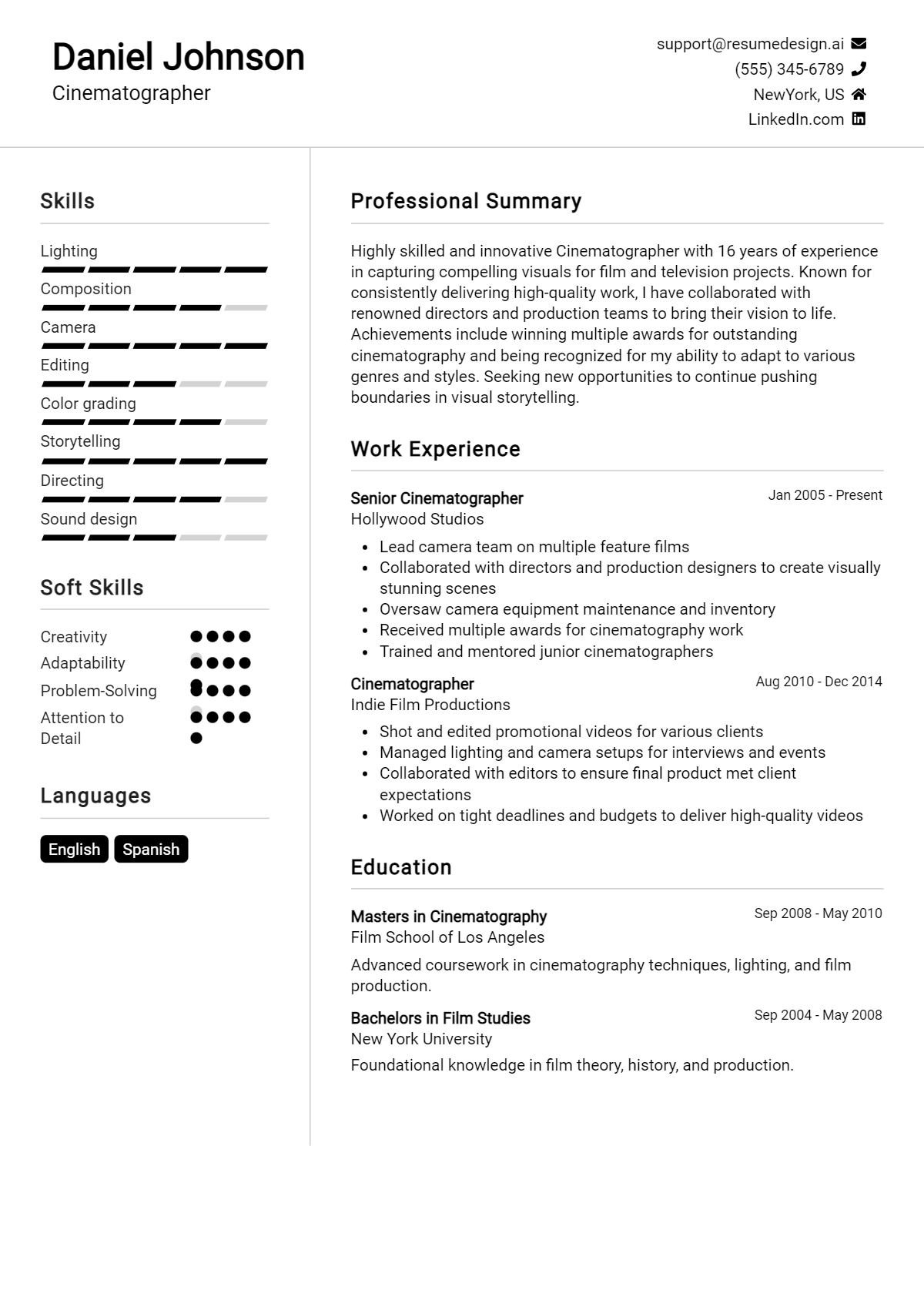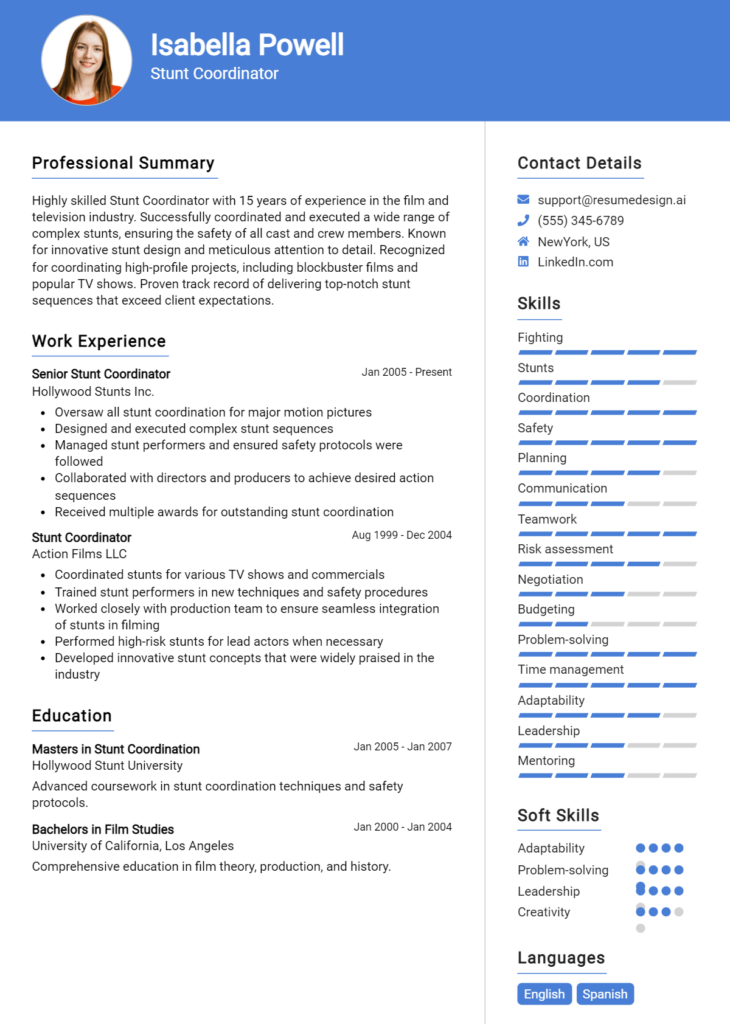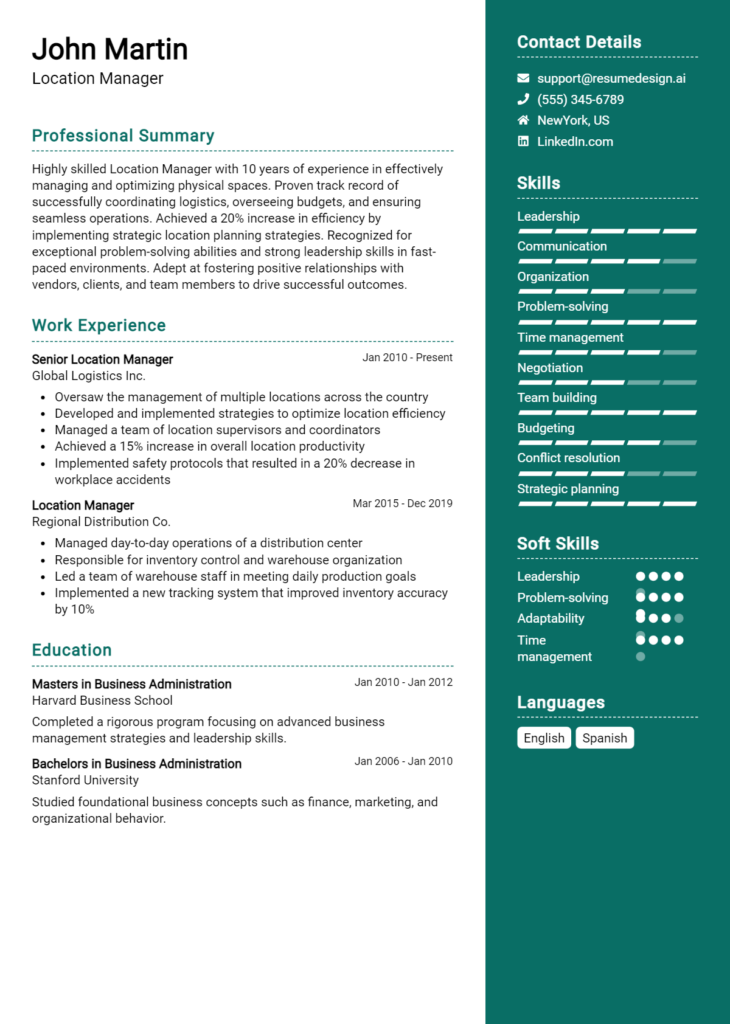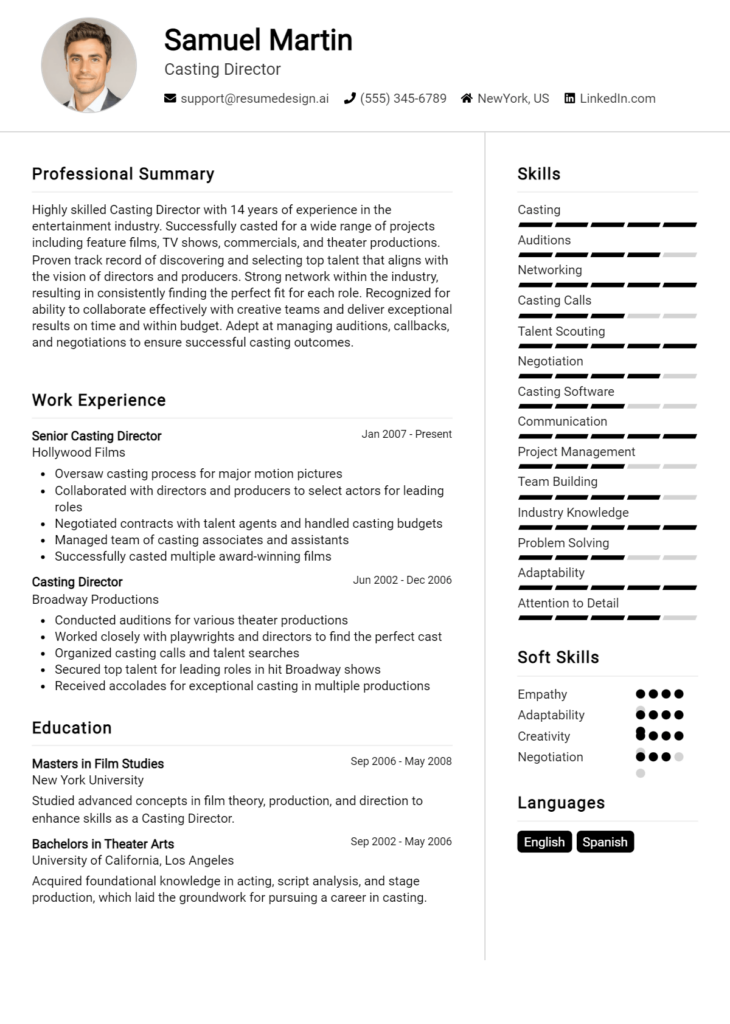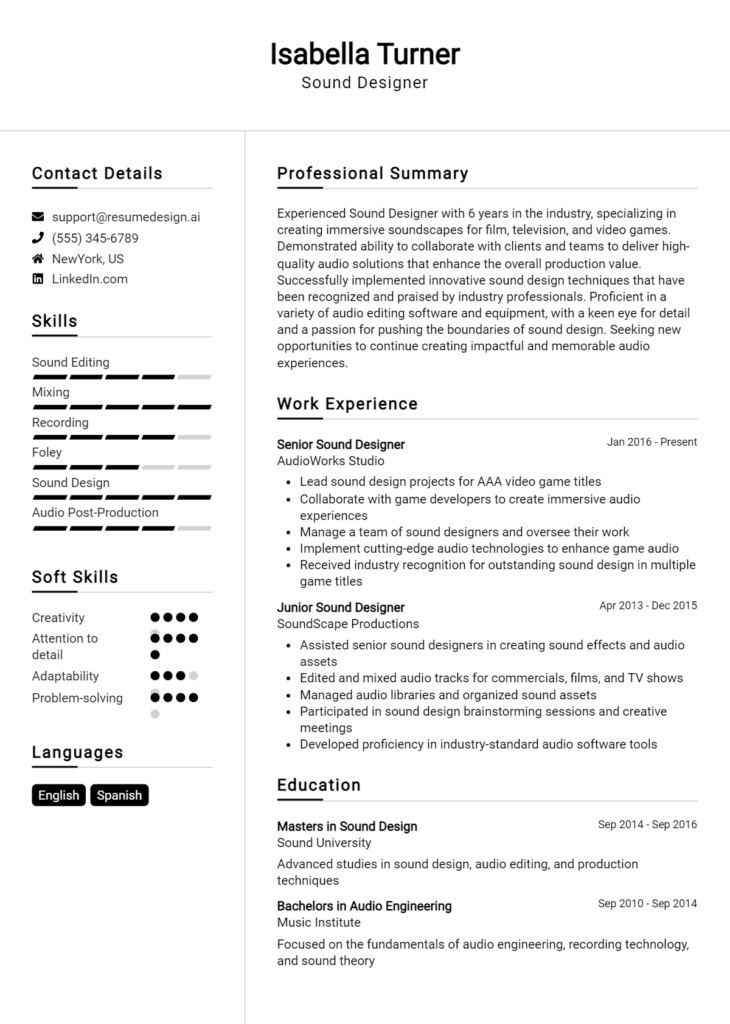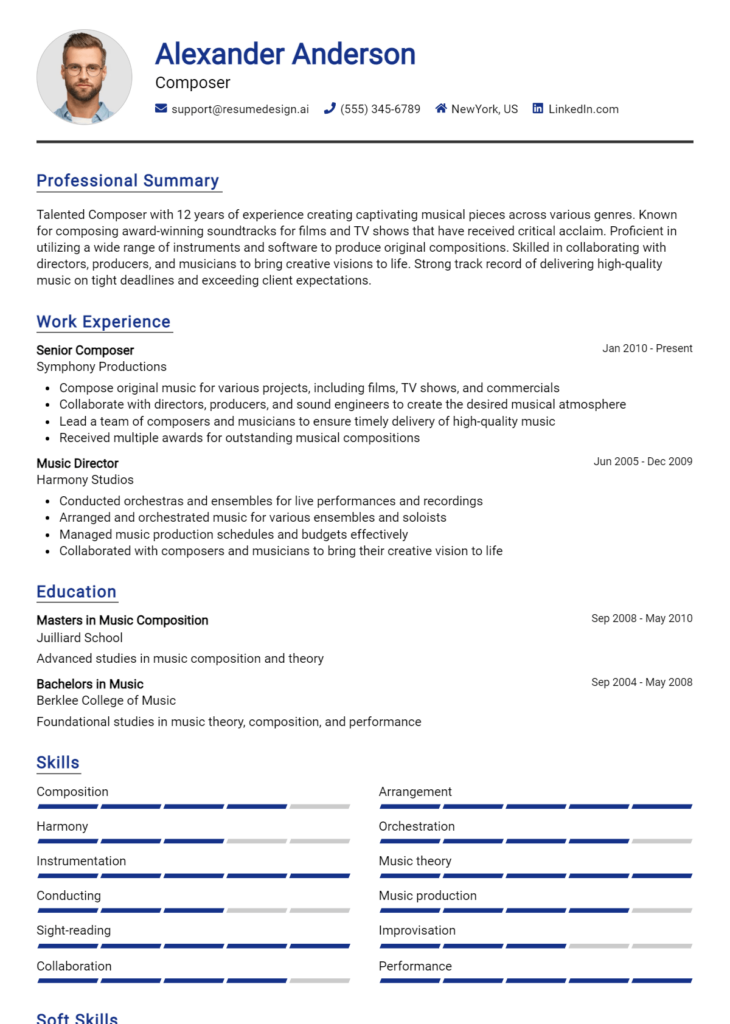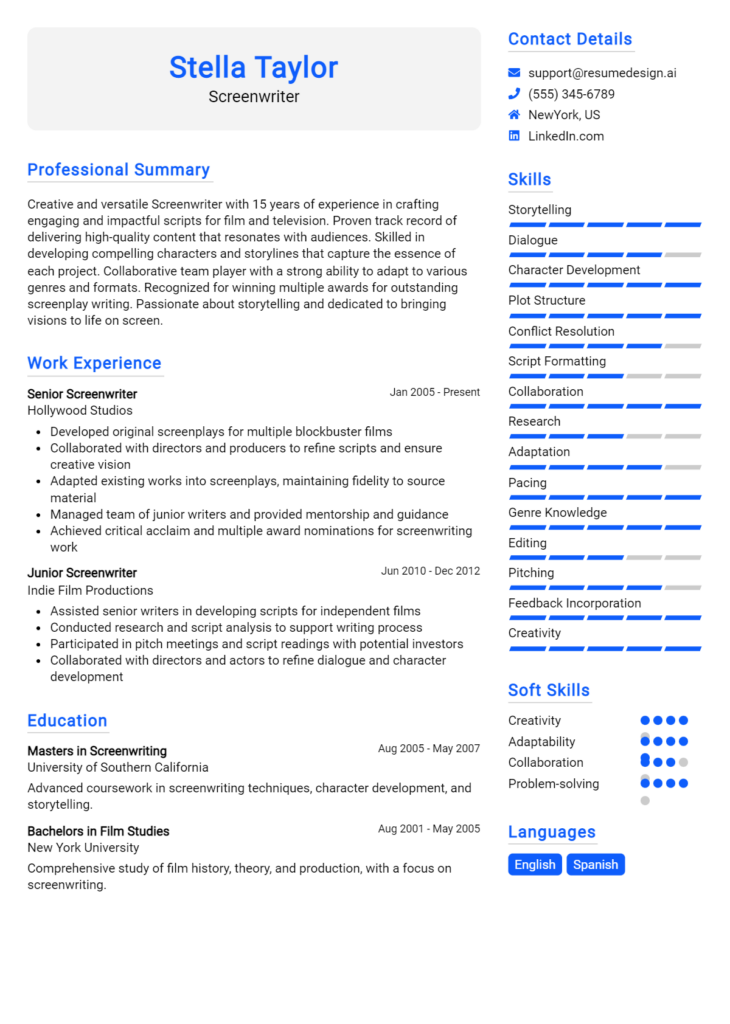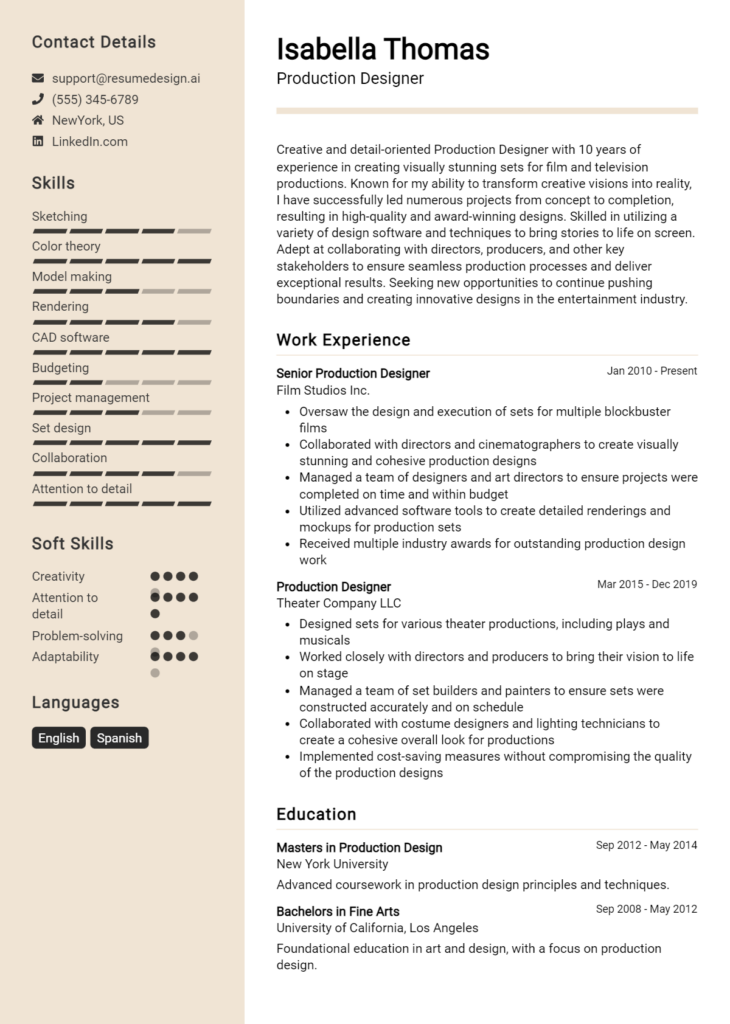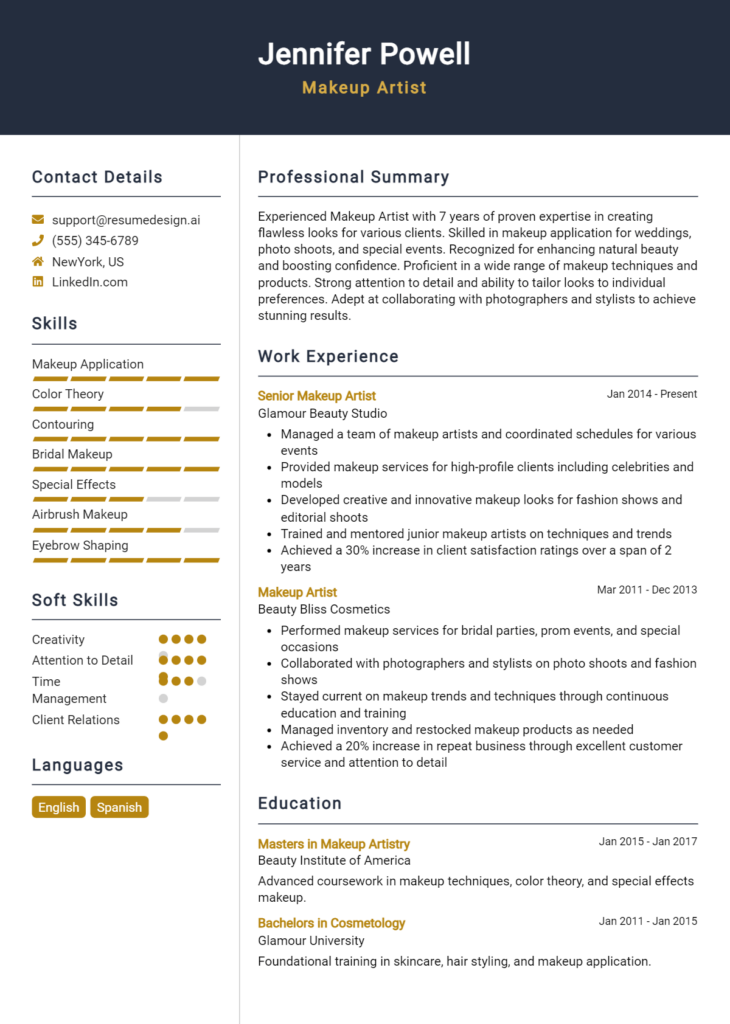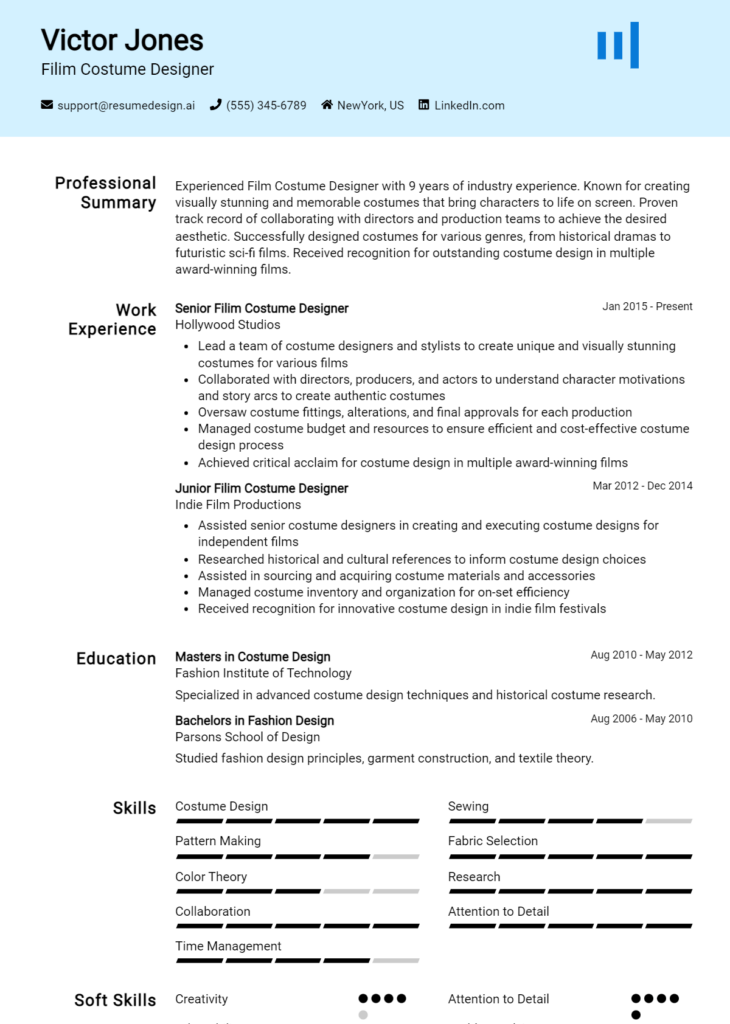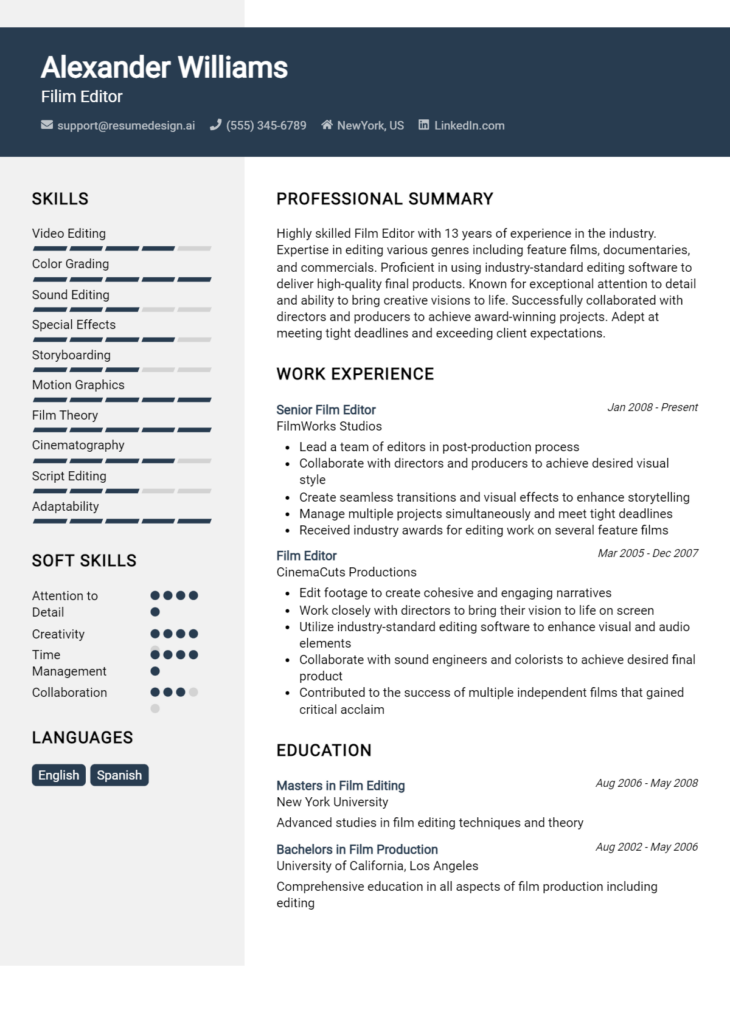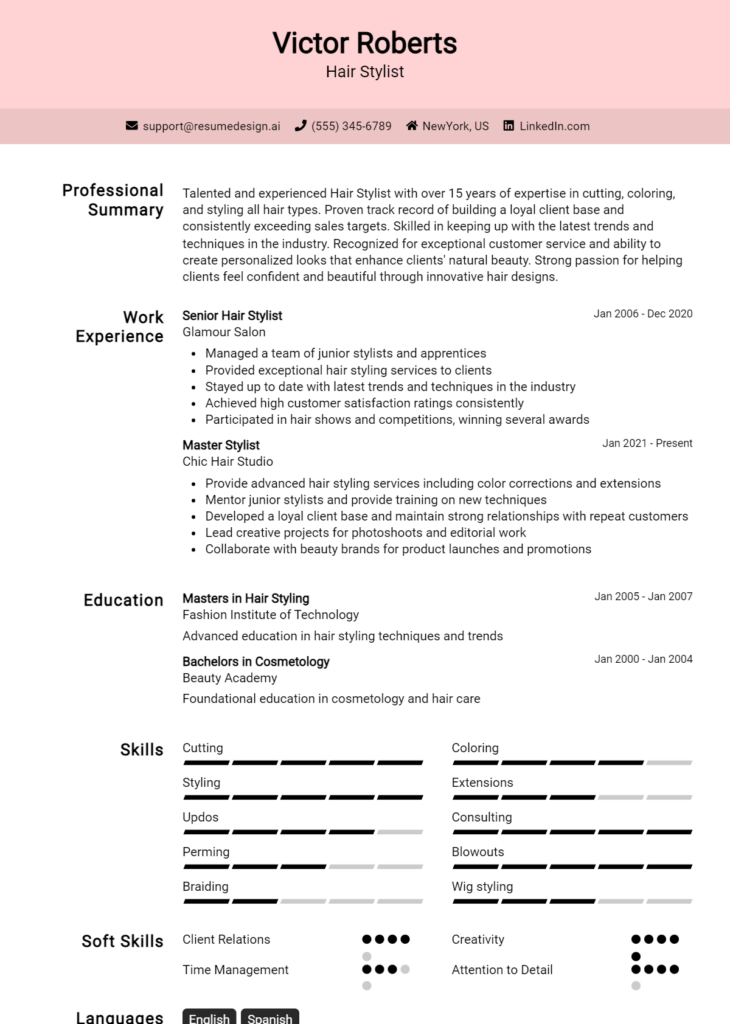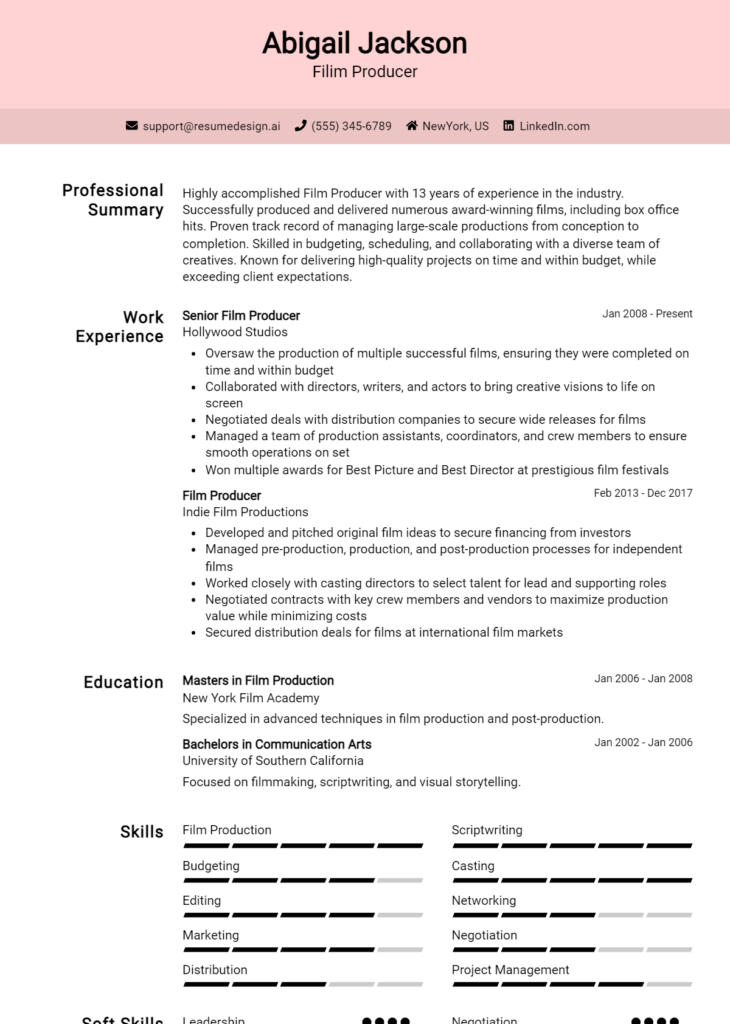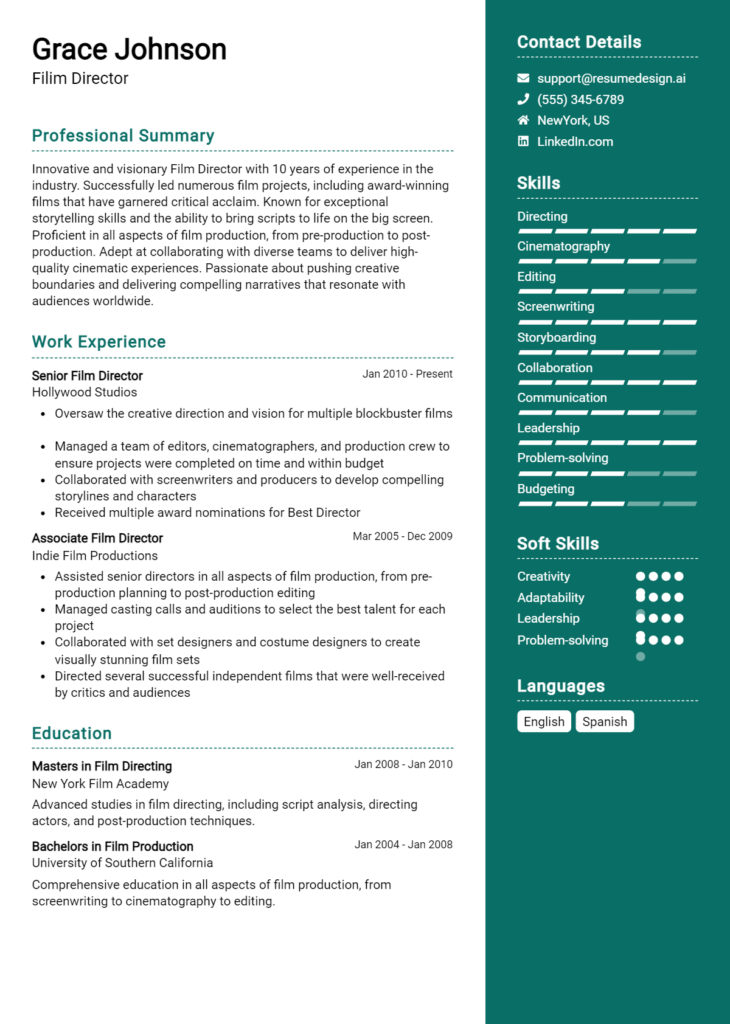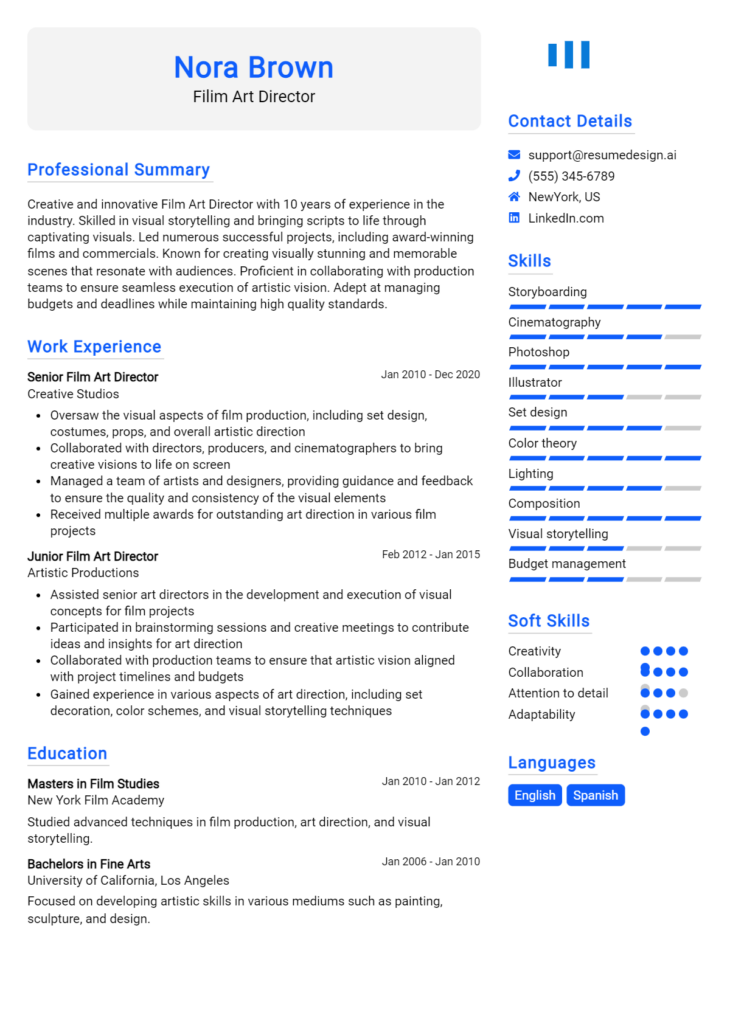Cinematographer Core Responsibilities
A Cinematographer plays a crucial role in visual storytelling, intertwining the creative vision of the director with the technical aspects of film production. Key responsibilities include selecting camera equipment, designing lighting, and framing shots to enhance narrative impact. Strong technical skills in camera operation, lighting design, and post-production are essential, as well as problem-solving abilities to address challenges on set. This role connects various departments, ensuring a cohesive visual experience that aligns with organizational goals. A well-structured resume can effectively highlight these competencies, showcasing a Cinematographer’s valuable contributions to the filmmaking process.
Common Responsibilities Listed on Cinematographer Resume
- Collaborate with directors to establish the visual style of the film.
- Choose and operate cameras, lenses, and lighting equipment.
- Plan and execute shot compositions and camera movements.
- Manage lighting setups to achieve desired effects.
- Supervise camera crews and coordinate their activities.
- Conduct tests to ensure optimal color and exposure.
- Work closely with the production designer to align visuals.
- Oversee the post-production process, including color grading.
- Adapt to evolving project requirements and technical challenges.
- Maintain equipment and ensure its functionality on set.
- Continuously research and implement new cinematographic techniques.
High-Level Resume Tips for Cinematographer Professionals
A well-crafted resume is essential for cinematographer professionals, as it serves as the first impression one makes on potential employers within the competitive film and video industry. Your resume must not only showcase your technical skills and artistic vision but also effectively highlight your unique achievements and contributions to past projects. In this guide, we will provide practical and actionable resume tips specifically tailored for cinematographer professionals, ensuring that your qualifications stand out in a crowded field and catch the eye of hiring managers.
Top Resume Tips for Cinematographer Professionals
- Tailor your resume to the job description by incorporating relevant keywords and phrases that match the requirements of the position.
- Showcase your most relevant experience by prioritizing roles that directly relate to cinematography, including notable projects you’ve worked on.
- Quantify your achievements where possible, such as mentioning awards won, budget sizes managed, or viewer metrics for projects.
- Highlight industry-specific skills, such as proficiency in camera equipment, lighting techniques, and editing software to demonstrate your technical expertise.
- Include a portfolio link that showcases your best work, allowing potential employers to see your cinematographic style and capabilities firsthand.
- Keep your resume visually appealing and easy to read, using clear headings and bullet points to allow for quick scanning of information.
- Incorporate any relevant certifications or training that enhance your qualifications, such as courses in film production or workshops on advanced cinematography techniques.
- Network references from industry professionals who can vouch for your skills and work ethic, including directors or producers you've collaborated with.
- Maintain a professional tone while allowing your personality to shine through, ensuring that the resume reflects who you are as a creative professional.
By implementing these tips, you can significantly increase your chances of landing a job in the cinematographer field. A well-structured and targeted resume not only highlights your skills and experiences but also conveys your passion for the art of cinematography, making you a compelling candidate in the eyes of potential employers.
Why Resume Headlines & Titles are Important for Cinematographer
In the competitive field of cinematography, a well-crafted resume headline or title serves as a crucial first impression for hiring managers. These brief statements encapsulate a candidate's key qualifications and unique strengths, effectively summarizing their professional identity in a single impactful phrase. A strong headline can instantly grab attention, setting the tone for the rest of the resume and enticing employers to read further. It should be concise, relevant, and directly aligned with the job being applied for, ensuring that it resonates with the specific requirements of the role.
Best Practices for Crafting Resume Headlines for Cinematographer
- Keep it concise: Aim for one impactful phrase that summarizes your expertise.
- Be specific: Tailor your headline to reflect the particular cinematography role you’re applying for.
- Highlight key strengths: Include your most relevant skills or achievements that align with the job description.
- Use action-oriented language: Choose dynamic verbs that convey your experience and energy.
- Incorporate industry keywords: Utilize terms that are common in job postings to increase visibility.
- Showcase unique qualifications: Mention any specialized training or niche skills that set you apart.
- Avoid jargon: Ensure the language is accessible and clear to all potential employers.
- Revise regularly: Update your headline to reflect new experiences or shifts in focus within your career.
Example Resume Headlines for Cinematographer
Strong Resume Headlines
Award-Winning Cinematographer Specializing in Narrative Film and Visual Storytelling
Experienced Cinematographer with a Proven Track Record in High-Profile Commercial Productions
Creative Cinematographer with Expertise in Drone and Aerial Filming Techniques
Weak Resume Headlines
Cinematographer Looking for Work
Film Professional with Experience
The strong headlines are effective because they provide a clear, specific snapshot of the candidate's qualifications and expertise, instantly conveying their value to potential employers. They use industry-relevant language and highlight unique skills that can set a candidate apart in a crowded job market. In contrast, the weak headlines fail to impress due to their vagueness and lack of detail; they do not offer any compelling information about the candidate's strengths or what makes them suitable for the role, leaving hiring managers disinterested and uninformed.
Writing an Exceptional Cinematographer Resume Summary
A well-crafted resume summary is crucial for a Cinematographer as it serves as the first impression for hiring managers, allowing candidates to quickly convey their expertise, creativity, and experience in the film industry. A strong summary succinctly captures key skills, notable achievements, and relevant experiences that align with the job description, making it easier for employers to see the value a candidate can bring to their projects. By being concise and impactful, the summary sets the tone for the rest of the resume, increasing the chances of grabbing attention in a competitive field.
Best Practices for Writing a Cinematographer Resume Summary
- Quantify achievements: Use numbers and specific metrics to highlight your impact in previous roles.
- Focus on skills: Highlight key technical and creative skills relevant to cinematography, such as camera operation, lighting techniques, and post-production knowledge.
- Tailor the summary: Customize your summary for each job application to reflect the specific requirements and qualifications listed in the job description.
- Showcase relevant experience: Mention specific projects, genres, or formats you have worked in that align with the target job.
- Be concise: Keep your summary to 2-4 sentences to maintain clarity and engage the reader quickly.
- Use strong action verbs: Start sentences with impactful verbs to convey confidence and initiative.
- Highlight collaboration: Mention any experience working with directors, producers, or other crew members to illustrate your ability to work as part of a team.
- Include awards or recognition: If applicable, briefly mention any accolades or industry recognition to stand out.
Example Cinematographer Resume Summaries
Strong Resume Summaries
Award-winning Cinematographer with over 8 years of experience in feature films and commercials, recognized for innovative lighting techniques that increased production quality by 30%. Proficient in both digital and film formats, with a strong background in collaboration with directors to create compelling visual narratives.
Creative Cinematographer specializing in documentary filmmaking, with a proven track record of producing visually striking content that has garnered over 1 million views across various platforms. Expertise in aerial cinematography and post-production editing, enhancing storytelling through dynamic visuals.
Dynamic Cinematographer with a focus on narrative-driven projects, having successfully completed over 15 short films and 5 feature productions. Skilled in utilizing advanced camera techniques and equipment, resulting in a 40% increase in audience engagement for recent projects.
Weak Resume Summaries
Experienced filmmaker looking for opportunities in cinematography. I have worked on various projects and know how to use different cameras.
Cinematographer with a background in visual storytelling and a passion for film. Seeking to contribute to a creative team.
The strong resume summaries are effective because they provide specific metrics and achievements, clearly outline relevant skills, and demonstrate the candidate's direct connection to the role. In contrast, the weak summaries are vague, lacking specific accomplishments and failing to convey what makes the candidate a strong fit for the position, ultimately diminishing their impact in a competitive hiring environment.
Work Experience Section for Cinematographer Resume
The work experience section of a Cinematographer's resume is crucial as it serves as a comprehensive showcase of the candidate's technical skills and creative vision. This section highlights not only the projects they have worked on but also their ability to lead teams and deliver high-quality visual content that meets industry standards. By quantifying achievements—such as the successful completion of projects on time and within budget—candidates can effectively demonstrate their value to potential employers. Aligning work experience with industry benchmarks further enhances credibility and showcases a clear understanding of the cinematography landscape.
Best Practices for Cinematographer Work Experience
- Highlight specific technical skills, such as proficiency in camera equipment, lighting techniques, and post-production software.
- Quantify achievements with metrics, such as budget management, audience reach, or awards won.
- Emphasize collaboration by detailing experiences working with directors, producers, and other crew members.
- Use action verbs to describe responsibilities and accomplishments, making statements more impactful.
- Tailor experiences to align with the job description, focusing on relevant projects and roles.
- Include notable projects or films that demonstrate your unique style and visual storytelling ability.
- Keep descriptions concise while providing enough detail to illustrate your contributions.
- Showcase leadership roles, such as leading a team of camera operators or mentoring junior cinematographers.
Example Work Experiences for Cinematographer
Strong Experiences
- Led a team of 10 on a feature film project that grossed $5 million at the box office, ensuring adherence to creative vision and production timelines.
- Developed innovative lighting techniques that reduced production costs by 25% while enhancing the visual quality of the project.
- Collaborated closely with the director on a documentary that won Best Cinematography at a national film festival, resulting in increased visibility and accolades for the production team.
- Managed the cinematography for a commercial campaign that achieved a 40% increase in client engagement, directly influencing the client’s sales growth.
Weak Experiences
- Worked on various film projects with no specific details or outcomes mentioned.
- Assisted in filming without highlighting any technical skills or contributions.
- Participated in team meetings without clarifying roles or responsibilities.
- Involved in post-production processes, but did not quantify impact or results achieved.
The examples categorized as strong experiences effectively illustrate quantifiable outcomes, technical leadership, and successful collaboration, thereby demonstrating the candidate's capabilities and contributions to the projects. In contrast, the weak experiences lack specificity and measurable results, making it challenging for potential employers to assess the candidate’s actual impact in previous roles. This distinction emphasizes the importance of clarity and quantification when detailing work history in a cinematographer's resume.
Education and Certifications Section for Cinematographer Resume
The education and certifications section of a Cinematographer's resume plays a crucial role in demonstrating the candidate's academic background and commitment to the craft. This section not only showcases relevant degrees and industry-recognized certifications but also highlights ongoing professional development and specialized training. By providing details on relevant coursework and credentials, candidates can enhance their credibility and better align their skills with the requirements of the job role, thereby increasing their chances of standing out in a competitive industry.
Best Practices for Cinematographer Education and Certifications
- Include degrees from accredited institutions, particularly in film, cinematography, or related fields.
- List industry-recognized certifications, such as those from organizations like the American Society of Cinematographers.
- Highlight relevant coursework that showcases specific skills or techniques applicable to cinematography.
- Prioritize recent certifications or training to demonstrate continuous learning.
- Use clear formatting to separate different educational experiences and certifications for readability.
- Tailor the education section to match the requirements of the job being applied for, emphasizing relevance.
- Include any workshops or seminars attended that focus on advanced cinematography techniques.
- Consider adding a brief description of any notable projects completed during your education.
Example Education and Certifications for Cinematographer
Strong Examples
- Bachelor of Fine Arts in Film Production, University of Southern California, 2020
- Certified Cinematographer, American Society of Cinematographers, 2021
- Advanced Cinematography Techniques Course, New York Film Academy, 2022
- Lighting for Film and Television Workshop, Los Angeles Film School, 2023
Weak Examples
- Bachelor of Arts in English Literature, State University, 2018
- Certification in Basic Photography, Local Community Center, 2019
- Diploma in Graphic Design, Online Learning Platform, 2020
- High School Diploma, Anytown High School, 2016
The strong examples are considered effective because they directly relate to cinematography and showcase relevant, advanced qualifications that enhance the candidate's expertise in the field. In contrast, the weak examples are less impactful as they either lack relevance to cinematography or reflect outdated or basic qualifications that do not support a professional-level application in the industry.
Top Skills & Keywords for Cinematographer Resume
A well-crafted resume is essential for a cinematographer, as it showcases not only artistic vision but also technical expertise. The skills highlighted in a cinematographer’s resume can significantly impact the impression they leave on potential employers and collaborators. It is crucial to balance both hard and soft skills to demonstrate a comprehensive understanding of the role. Hard skills reflect technical proficiency in camera operation and lighting techniques, while soft skills highlight interpersonal abilities like teamwork and communication. By effectively showcasing both sets of skills, a cinematographer can present themselves as a versatile and capable candidate ready to contribute to any film project.
Top Hard & Soft Skills for Cinematographer
Soft Skills
- Creativity
- Communication
- Collaboration
- Problem-solving
- Attention to Detail
- Adaptability
- Time Management
- Leadership
- Vision
- Critical Thinking
- Emotional Intelligence
- Networking
- Artistic Sensibility
- Patience
- Project Management
Hard Skills
- Camera Operation
- Lighting Techniques
- Color Grading
- Composition and Framing
- Editing Software Proficiency (e.g., Adobe Premiere Pro, Final Cut Pro)
- Knowledge of Film Production Processes
- Familiarity with Various Camera Equipment (e.g., DSLRs, RED Cameras)
- Understanding of Visual Storytelling
- Technical Knowledge of Lenses
- Sound Recording Techniques
- Knowledge of Set Design
- Experience with Drone Filming
- Familiarity with Motion Capture Technology
- Understanding of Digital Cinematography
- Proficiency in Shot Planning
- Lighting Design
- Post-Production Techniques
Developing a robust skills section and detailing relevant work experience will further enhance a cinematographer's resume, making it more appealing to hiring managers and increasing the chances for successful job placements.
Stand Out with a Winning Cinematographer Cover Letter
Dear [Hiring Manager's Name],
I am writing to express my enthusiasm for the Cinematographer position at [Company Name] as advertised on [Job Board/Website]. With over [X years] of experience in crafting compelling visual narratives in film and television, I am excited about the opportunity to bring my unique perspective and technical skills to your esteemed production team. My passion for storytelling through visual art, combined with a strong foundation in lighting, composition, and camera operation, enables me to create striking images that resonate with audiences.
Throughout my career, I have had the privilege of collaborating with diverse directors and creative teams on projects ranging from indie films to commercial campaigns. My recent work on [specific project or film name] not only honed my ability to adapt to various shooting conditions but also reinforced my belief in the power of collaboration. I strive to understand the director's vision, ensuring that every frame contributes to the overall narrative while maintaining a distinct visual style. My proficiency with both digital and analog cameras, along with a strong understanding of post-production processes, allows me to deliver high-quality work that meets and exceeds project expectations.
I am particularly drawn to [Company Name] because of your commitment to innovative storytelling and your impressive portfolio of visually stunning projects. I am eager to contribute my creativity and technical expertise to help elevate your upcoming productions. I believe my ability to blend artistry with technical precision will make me a valuable asset to your team, and I am excited about the opportunity to explore new creative avenues together.
Thank you for considering my application. I look forward to the possibility of discussing how my experience and vision align with the goals of [Company Name]. Please feel free to reach out to me at your earliest convenience to schedule a conversation.
Sincerely,
[Your Name]
[Your Contact Information]
[Your LinkedIn Profile or Portfolio Link]
Common Mistakes to Avoid in a Cinematographer Resume
Crafting a resume as a cinematographer is a unique challenge, as it requires not only showcasing technical skills and artistic vision but also presenting them in a compelling manner. Many cinematographers, especially those new to the industry, often make mistakes that can hinder their chances of landing an interview. Understanding these common pitfalls can help you create a more effective resume that stands out to potential employers.
Lack of Specificity: Vague descriptions of past projects can make it difficult for employers to gauge your experience. Always include specific details about your role, the type of projects, and your contributions.
Ignoring Visual Elements: Cinematography is a visual art, and your resume should reflect that. A plain, text-heavy resume may not convey your creativity; consider incorporating visual elements or a link to your portfolio.
Neglecting Technical Skills: Failing to list relevant technical skills, such as proficiency with specific cameras, editing software, or lighting techniques, can come across as unprofessional. Be sure to highlight your technical expertise clearly.
Overloading with Jargon: While industry-specific language can demonstrate your knowledge, overloading your resume with jargon can alienate hiring managers. Aim for clarity and balance.
Omitting Collaboration Experience: Cinematography often involves teamwork. Not mentioning your experience working alongside directors, producers, or other crew members may downplay your collaborative skills, which are crucial in film production.
Not Tailoring the Resume: Sending out a generic resume is a missed opportunity. Tailor your resume for each job application to align your experience with the specific requirements and values of each employer.
Inconsistent Formatting: A lack of consistent formatting can make your resume look unprofessional and hard to read. Ensure uniformity in font styles, bullet points, and spacing throughout the document.
Forgetting About Soft Skills: While technical skills are essential, soft skills such as communication, adaptability, and problem-solving are equally important. Highlighting these can help round out your qualifications.
Conclusion
As a cinematographer, your role is pivotal in storytelling through visual imagery. You are responsible for capturing the essence of a narrative, creating mood and tone with lighting, camera angles, and composition. A successful cinematographer not only possesses technical skills but also has a strong artistic vision, enabling them to collaborate effectively with directors and other crew members.
Throughout this article, we have explored the essential skills and qualifications required for a cinematographer, including proficiency in camera operation, an understanding of lighting techniques, and a keen eye for detail. We discussed the importance of a strong portfolio that showcases your previous work, as well as the need for networking within the film industry to secure opportunities.
In conclusion, it's critical to ensure that your Cinematographer Resume reflects your skills and experiences accurately. Take the time to review and update your resume to highlight your strengths and achievements in the field. To assist you in this process, consider utilizing valuable resources like resume templates, which can provide a professional layout for your information. You might also find a resume builder helpful for creating a polished resume tailored to your unique style. Additionally, check out resume examples that can inspire you to present your experience effectively, alongside cover letter templates that will complement your application. Take action today to enhance your professional presence and open doors to exciting new opportunities in cinematography!

